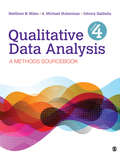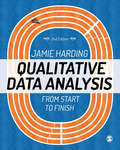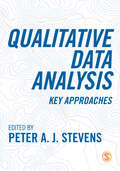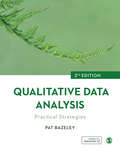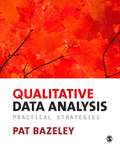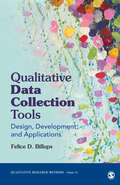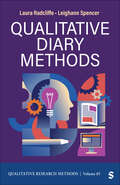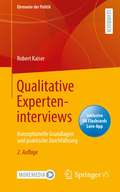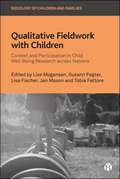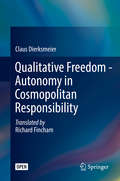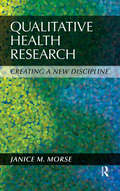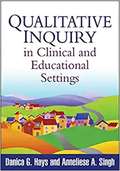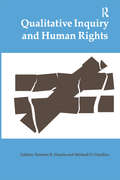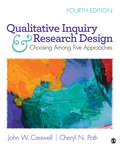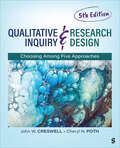- Table View
- List View
Qualitative Data Analysis: A Methods Sourcebook
by Johnny Saldaña Matthew B. Miles A. Michael Huberman"This comprehensive, practical, user-friendly book provides a wealth of data analysis strategies that are essential for any qualitative research. It is a must-have tool book for moving from data analysis to writing for publication!" –Guofang Li, University of British Columbia, Canada Miles, Huberman, and Saldaña’s Qualitative Data Analysis: A Methods Sourcebook is the authoritative text for analyzing and displaying qualitative research data. The Fourth Edition maintains the analytic rigor of previous editions while showcasing a variety of new visual display models for qualitative inquiry. Graphics are added to the now-classic matrix and network illustrations of the original co-authors. Five chapters have been substantially revised, and the appendix’s annotated bibliography includes new titles in research methods. Graduate students and established scholars from all disciplines will find this resource an innovative compendium of ideas for the representation and presentation of qualitative data. As the authors demonstrate, when researchers "think display," their analyses of social life capture the complex and vivid processes of the people and institutions studied.
Qualitative Data Analysis: A Methods Sourcebook
by Johnny Saldaña Matthew B. Miles A. Michael Huberman"This comprehensive, practical, user-friendly book provides a wealth of data analysis strategies that are essential for any qualitative research. It is a must-have tool book for moving from data analysis to writing for publication!" –Guofang Li, University of British Columbia, Canada Miles, Huberman, and Saldaña’s Qualitative Data Analysis: A Methods Sourcebook is the authoritative text for analyzing and displaying qualitative research data. The Fourth Edition maintains the analytic rigor of previous editions while showcasing a variety of new visual display models for qualitative inquiry. Graphics are added to the now-classic matrix and network illustrations of the original co-authors. Five chapters have been substantially revised, and the appendix’s annotated bibliography includes new titles in research methods. Graduate students and established scholars from all disciplines will find this resource an innovative compendium of ideas for the representation and presentation of qualitative data. As the authors demonstrate, when researchers "think display," their analyses of social life capture the complex and vivid processes of the people and institutions studied.
Qualitative Data Analysis: From Start to Finish
by Jamie HardingThis is the ideal book to get you up and running with the basics of qualitative data analysis. It breaks everything down into a series of simple steps and introduces the practical tools and techniques you need to turn your transcripts into meaningful research. Using multidisciplinary data from interviews and focus groups Jamie Harding provides clear guidance on how to apply key research skills such as making summaries, identifying similarities, drawing comparisons and using codes. The book sets out real world applicable advice, provides easy to follow best practice and helps you to: · Manage and sort your data · Find your argument and define your conclusions · Answer your research question · Write up your research for assessment and dissemination Clear, pragmatic and honest this book will give you the perfect framework to start understanding your qualitative data and to finish your research project.
Qualitative Data Analysis: From Start to Finish
by Jamie HardingThis is the ideal book to get you up and running with the basics of qualitative data analysis. It breaks everything down into a series of simple steps and introduces the practical tools and techniques you need to turn your transcripts into meaningful research. Using multidisciplinary data from interviews and focus groups Jamie Harding provides clear guidance on how to apply key research skills such as making summaries, identifying similarities, drawing comparisons and using codes. The book sets out real world applicable advice, provides easy to follow best practice and helps you to: · Manage and sort your data · Find your argument and define your conclusions · Answer your research question · Write up your research for assessment and dissemination Clear, pragmatic and honest this book will give you the perfect framework to start understanding your qualitative data and to finish your research project.
Qualitative Data Analysis: Key Approaches
by Peter A. StevensWith numerous approaches to choose from, knowing where to start when doing qualitative data analysis (QDA) can be a challenge. This book gives you direction with an accessible and thorough introduction to nine different approaches to QDA, written by a multi-disciplinary team with years of experience teaching and analysing data using these methods. With a clear focus on the ‘how to’ of QDA, each chapter includes: •Step-by-step descriptions of how to apply each approach in your research •Online and in-text activities to help you practice your skills •Annotated reading lists so you can dig deeper into key topics •Case studies from a range of disciplines so you can see how each approach works in practice. The perfect companion on your journey through QDA, the book also offers a comprehensive introduction to the use of NVivo QDA software, helping both new and experienced researchers get to grips with the essentials.
Qualitative Data Analysis: Key Approaches
by Peter A. StevensWith numerous approaches to choose from, knowing where to start when doing qualitative data analysis (QDA) can be a challenge. This book gives you direction with an accessible and thorough introduction to nine different approaches to QDA, written by a multi-disciplinary team with years of experience teaching and analysing data using these methods. With a clear focus on the ‘how to’ of QDA, each chapter includes: •Step-by-step descriptions of how to apply each approach in your research •Online and in-text activities to help you practice your skills •Annotated reading lists so you can dig deeper into key topics •Case studies from a range of disciplines so you can see how each approach works in practice. The perfect companion on your journey through QDA, the book also offers a comprehensive introduction to the use of NVivo QDA software, helping both new and experienced researchers get to grips with the essentials.
Qualitative Data Analysis: Practical Strategies
by Dr. Pat BazeleyBalancing theoretical foundations with practical strategies, this book helps you develop an approach to your qualitative analysis that is both systematic and insightful. It demonstrates the importance of tying analysis into every aspect of research, from design, through data collection and management, to writing up, and provides step-by-step guidance on how to embed analysis from start to finish. Grounded in the reality of doing research, this second edition: • Presents visual and text-based methods for analysis, using manual and digital tools • Inspires confidence as you code, connect and interrogate observational, text and visual data • Showcases best practice and helps you navigate real-life dilemmas using case studies of research from across the social sciences. Together with rich online resources including videos, datasets and journal articles, this is an important new edition for all students undertaking qualitative research, with a focus on analysis and design.
Qualitative Data Analysis: Practical Strategies
by Dr. Pat BazeleyBalancing theoretical foundations with practical strategies, this book helps you develop an approach to your qualitative analysis that is both systematic and insightful. It demonstrates the importance of tying analysis into every aspect of research, from design, through data collection and management, to writing up, and provides step-by-step guidance on how to embed analysis from start to finish. Grounded in the reality of doing research, this second edition: • Presents visual and text-based methods for analysis, using manual and digital tools • Inspires confidence as you code, connect and interrogate observational, text and visual data • Showcases best practice and helps you navigate real-life dilemmas using case studies of research from across the social sciences. Together with rich online resources including videos, datasets and journal articles, this is an important new edition for all students undertaking qualitative research, with a focus on analysis and design.
Qualitative Data Analysis: Practical Strategies
by Patricia BazeleyWritten by an experienced researcher in the field of qualitative methods, this dynamic new book provides a definitive introduction to analysing qualitative data. It is a clear, accessible and practical guide to each stage of the process, including: - Designing and managing qualitative data for analysis - Working with data through interpretive, comparative, pattern and relational analyses - Developing explanatory theory and coherent conclusions, based on qualitative data. The book pairs theoretical discussion with practical advice using a host of examples from diverse projects across the social sciences. It describes data analysis strategies in actionable steps and helpfully links to the use of computer software where relevant. This is an exciting new addition to the literature on qualitative data analysis and a must-read for anyone who has collected, or is preparing to collect, their own data.
Qualitative Data Collection Tools: Design, Development, and Applications (Qualitative Research Methods #55)
by Felice D. BillupsQualitative Data Collection Tools: Design, Development, and Applications is a new and unique supplementary text that will guide students and new researchers to design, develop, pilot, and employ qualitative tools in order to collect qualitative data. An often-omitted subject in general qualitative textbooks, qualitative tools form the backbone of the data collection process. Students and new researchers are frequently left to create their own qualitative tools from scratch, an unnecessary hurdle in the qualitative research design process. Author Felice D. Billups has used her experience as a qualitative researcher, and in teaching and advising students about qualitative research, to develop the templates in this book as a starting point for readers conducting original qualitative research. The author briefly describes each method of data collection and offers readers suggestions for using and adapting the qualitative instrument templates within the text. Templates of interview protocols, focus group moderator guides, content analysis tools, document analysis tools, reflective questionnaires, diary and journal logs, and observational rubrics give the reader either a cut-and-paste solution for their own research or a starting point to design their own personalized qualitative tools. The first three chapters illuminate the qualitative data collection process and the role each type of qualitative tool plays in that process. The next six chapters provide detailed guides and numerous templates for each qualitative data collection method, covering interviews, focus groups, conversation and discourse analysis, observations, document analysis, field notes, journaling, and other reflective practices. A final chapter pulls together the multifaceted nature of qualitative research design and connects each tool back to the methodology to ensure trustworthiness and rigor in the data collection and instrument development process. Exemplars populate the appendices, offering readers concrete inspiration for ways to use and adapt the tools provided. If you have ever puzzled over how to best to design qualitative tools in order to guide and structure your qualitative data collection, or if you are embarking on your first qualitative study, Qualitative Data Collection Tools will give you a practical starting point to help make your qualitative data collection process easier and more organized.
Qualitative Data Collection Tools: Design, Development, and Applications (Qualitative Research Methods #55)
by Felice D. BillupsQualitative Data Collection Tools: Design, Development, and Applications is a new and unique supplementary text that will guide students and new researchers to design, develop, pilot, and employ qualitative tools in order to collect qualitative data. An often-omitted subject in general qualitative textbooks, qualitative tools form the backbone of the data collection process. Students and new researchers are frequently left to create their own qualitative tools from scratch, an unnecessary hurdle in the qualitative research design process. Author Felice D. Billups has used her experience as a qualitative researcher, and in teaching and advising students about qualitative research, to develop the templates in this book as a starting point for readers conducting original qualitative research. The author briefly describes each method of data collection and offers readers suggestions for using and adapting the qualitative instrument templates within the text. Templates of interview protocols, focus group moderator guides, content analysis tools, document analysis tools, reflective questionnaires, diary and journal logs, and observational rubrics give the reader either a cut-and-paste solution for their own research or a starting point to design their own personalized qualitative tools. The first three chapters illuminate the qualitative data collection process and the role each type of qualitative tool plays in that process. The next six chapters provide detailed guides and numerous templates for each qualitative data collection method, covering interviews, focus groups, conversation and discourse analysis, observations, document analysis, field notes, journaling, and other reflective practices. A final chapter pulls together the multifaceted nature of qualitative research design and connects each tool back to the methodology to ensure trustworthiness and rigor in the data collection and instrument development process. Exemplars populate the appendices, offering readers concrete inspiration for ways to use and adapt the tools provided. If you have ever puzzled over how to best to design qualitative tools in order to guide and structure your qualitative data collection, or if you are embarking on your first qualitative study, Qualitative Data Collection Tools will give you a practical starting point to help make your qualitative data collection process easier and more organized.
Qualitative Diary Methods (Qualitative Research Methods)
by Laura Radcliffe Leighann SpencerQualitative diary methods (QDMs) are a versatile range of multi-modal data collection methods that involve participants recording events and experiences, and emotions and reflections, as they happen, on multiple occasions and over a particular time period. These data collection methods include a pen and paper diary, as well as other electronic modes of diary keeping, including text but also audio, photo-, video-, and app-based diaries that allow for a range of modalities. This book covers the diversity of QDM options available to researchers, providing a clear rationale as to when and why different qualitative diary methods could be used. The authors consider research design, and ethical considerations for each of the distinct QDM approaches and provide end-of-chapter checklists and activities to help readers apply the methods to their own research.
Qualitative Diary Methods (Qualitative Research Methods)
by Laura Radcliffe Leighann SpencerQualitative diary methods (QDMs) are a versatile range of multi-modal data collection methods that involve participants recording events and experiences, and emotions and reflections, as they happen, on multiple occasions and over a particular time period. These data collection methods include a pen and paper diary, as well as other electronic modes of diary keeping, including text but also audio, photo-, video-, and app-based diaries that allow for a range of modalities. This book covers the diversity of QDM options available to researchers, providing a clear rationale as to when and why different qualitative diary methods could be used. The authors consider research design, and ethical considerations for each of the distinct QDM approaches and provide end-of-chapter checklists and activities to help readers apply the methods to their own research.
Qualitative Experteninterviews: Konzeptionelle Grundlagen und praktische Durchführung (Elemente der Politik)
by Robert KaiserDas Lehrbuch richtet sich primär an Studierende und jüngere Wissenschaftlerinnen und Wissenschaftler und bietet in knapper, aber systematischer Form eine praxisorientierte Handreichung für die Planung und Durchführung qualitativer Experteninterviews in der Politikwissenschaft. Es vermittelt einen methodisch fundierten und anwendungs- bzw. problemorientierten Zugang zu dieser Form der eigenständigen qualitativen Datenerhebung. Für die 2. Auflage wurde das Buch grundlegend aktualisiert und um ein Unterkapitel zur software-basieren Unterstützung der Durchführung von Experteninterviews ergänzt. Zusätzliche Fragen per App: Laden Sie die SN Flashcards App kostenlos herunter und nutzen Sie exklusives Zusatzmaterial, um Ihr Wissen zu prüfen.
Qualitative Fieldwork with Children: Context and Participation in Child Well-Being Research across Nations (Sociology of Children and Families)
by Lise Mogensen, Susann Fegter, Lisa Fischer, Jan Mason and Tobia FattoreDrawing on the multinational qualitative study ‘Children’s Understandings of Well-being’ (CUWB), this unique edited collection offers practical insights into conducting fieldwork across diverse geographical, social and cultural contexts, using the same basic protocol. The book explores the practical, ethical and philosophical challenges the researchers faced, and the ways in which these issues were dealt with by the different research teams. Contributors provide rare insights into the diverse institutional requirements and professional practices highlighting the way research methods are embedded in contexts that are at one and the same time both local and global. With contributions from experts in child well-being research from Argentina, Australia, Canada, Chile, Germany, Romania, South Africa, Switzerland, Turkey, the UK and the US, the book provides valuable perspectives for researchers across a wide range of settings.
Qualitative Forschung in der Kommunikationswissenschaft: Eine Praxisorientierte Einführung (Studienbücher Zur Kommunikations- Und Medienwissenschaft Ser.)
by Michael Meyen Claudia Riesmeyer Maria Löblich Senta Pfaff-RüdigerDas Lehrbuch versteht sich als Anleitung zum Forschen: Wo lassen sich qualitative Methoden in der Kommunikationswissenschaft gewinnbringend einsetzen? Wie muss eine Untersuchung aufgebaut werden und wie werden Befragte oder Texte so ausgewählt, dass man am Ende verallgemeinern kann? Wie konstruiere ich einen Interview-Leitfaden und was muss ich beachten, damit eine Gruppendiskussion oder eine Beobachtung wirklich funktionieren? Befrage ich offline oder online und was kann ich tun, damit ich nicht in einem Materialberg untergehe? Mit zahlreichen Beispielen aus der Forschungspraxis.
Qualitative Freedom - Autonomy in Cosmopolitan Responsibility
by Claus DierksmeierIn the light of growing political and religious fundamentalism, this open access book defends the idea of freedom as paramount for the attempt to find common ethical ground in the age of globality. The book sets out to examine as yet unexhausted ways to boost the resilience of the principle of liberalism. Critically reviewing the last 200 years of the philosophy of freedom, it revises the principle of liberty in order to revive it. It discusses many different aspects that fall under its three main topics: the metaphysics of freedom, quantitative freedom and qualitative freedom. Open societies worldwide have come under increasing pressure in the last decades. The belief that politics and markets fare best when guided by the principle of liberty presently faces multiple challenges such as terrorism, climate warming, inequality, populism, and financial crises. In the view of its critics, the idea of freedom no longer offers adequate guidance to meet these challenges and should be partially corrected or even entirely replaced by countervailing values. Against the reduction of freedom to the merely quantitative question as to how much liberties individuals call their own, this book draws attention to the qualitative concerns which and whose opportunities society should foster. It argues that, correctly understood, the idea of liberty commits us to defend as well as advance the freedom of each and every world citizen.
Qualitative Health Research: Creating a New Discipline
by Janice M MorseThe leading figure in qualitative health research (QHR), Janice M. Morse, asserts that QHR is its own separate discipline—distinct from both traditional health research and other kinds of qualitative research—and examines the implications of this position for theory, research, and practice. She contends that the health care environments transform many of the traditional norms of qualitative research and shape a new and different kind of research tradition. Similarly, the humanizing ethos of qualitative health research has much to teach traditional researchers and practitioners in health disciplines. She explores how the discipline of QHR can play out in practice, both in the clinic and in the classroom, in North America and around the world. A challenging, thought-provoking call to rethink how to conduct qualitative research in health settings.
Qualitative Inquiry In Clinical And Educational Settings
by Danica G. Hays Anneliese A. SinghThis highly readable text demystifies the qualitative research process—and helps readers conceptualize their own studies—by organizing the different research paradigms and traditions into coherent clusters. Real-world examples and firsthand perspectives illustrate the research process; instructive exercises and activities build on each other so readers can develop their own proposals or reports as they work through the book. Provided are strategies for selecting a research topic, entering and exiting sites, and navigating the complexities of ethical issues and the researcher's role. <P><P> Readers learn how to use a range of data collection methods—including observational strategies, interviewing, focus groups, e-mail and chat rooms, and arts-based media—and to manage, analyze, and report the resulting data. Useful pedagogical features include: *In-class and field activities to apply qualitative concepts. *Discussion questions, proposal development exercises, and reflexive journal activities. *Exemplary qualitative studies and two sample proposals. *Cautionary notes, or "Wild Cards," about possible research pitfalls. *Tables that summarize concepts and present helpful tips.
Qualitative Inquiry and Global Crises (International Congress of Qualitative Inquiry Series)
by Norman K. Denzin Michael D. GiardinaThis plenary volume from the Sixth International Congress on Qualitative Inquiry (2010) highlights the variety of roles played by qualitative researchers in addressing global communities in crisis. It shows how qualitative researchers can bridge gaps in cultural and linguistic understanding to address issues of disparity in race, ethnicity, gender, and environment in the interests of global social justice and human rights. Authored by many of the world’s leading qualitative researchers, the signature articles in this volume point qualitative researchers toward a research stance of ethics, meaning, and advocacy.
Qualitative Inquiry and Human Rights (International Congress of Qualitative Inquiry Series)
by Norman K. Denzin Michael D. GiardinaQualitative researchers are increasingly being called upon to become human rights advocates, to help individuals and communities honor the sanctity of life, and to promote the core values of privacy, justice, freedom, peace, and human dignity. In this volume of plenary papers from the Fifth International of Qualitative Inquiry in 2009, leading qualitative researchers show the various dimensions of the human rights work being done by scholar/activists in the social sciences, education, health care, social services, cultural studies, and other fields.
Qualitative Inquiry and Research Design: Choosing Among Five Approaches
by John W. Creswell Cheryl N. PothIn the revised Fourth Edition of the best-selling text, John W. Creswell and new co-author Cheryl N. Poth explore the philosophical underpinnings, history, and key elements of five qualitative inquiry approaches: narrative research, phenomenology, grounded theory, ethnography, and case study. Preserving Creswell's signature writing style, the authors compare the approaches and relate research designs to each of the traditions of inquiry in a highly accessible manner. Featuring new content, articles, pedagogy, references, and expanded coverage of ethics throughout, the Fourth Edition is an ideal introduction to the theories, strategies, and practices of qualitative inquiry.
Qualitative Inquiry and Research Design: Choosing Among Five Approaches
by John W. Creswell Cheryl N. PothIn the revised Fourth Edition of the best-selling text, John W. Creswell and new co-author Cheryl N. Poth explore the philosophical underpinnings, history, and key elements of five qualitative inquiry approaches: narrative research, phenomenology, grounded theory, ethnography, and case study. Preserving Creswell's signature writing style, the authors compare the approaches and relate research designs to each of the traditions of inquiry in a highly accessible manner. Featuring new content, articles, pedagogy, references, and expanded coverage of ethics throughout, the Fourth Edition is an ideal introduction to the theories, strategies, and practices of qualitative inquiry.
Qualitative Inquiry and Research Design: Choosing Among Five Approaches
by John W. Creswell Cheryl N. PothIn the Fifth Edition of the bestselling text Qualitative Inquiry and Research Design: Choosing Among Five Approaches, John W. Creswell and Cheryl N. Poth guide researchers in selecting the best option for their studies by exploring, evaluating, and applying five qualitative research approaches: narrative research, phenomenology, grounded theory, ethnography, and case study. For each of these qualitative inquiry traditions, the authors explore the philosophical underpinnings, history, defining features, common data procedures, and writing structures. With expanded content reflecting technological developments in the qualitative research process, more inclusivity and diversity in examples, and updated references, the Fifth Edition is an ideal introduction to the theories, strategies, and practices of qualitative research. Winner of the 2018 Textbook & Academic Authors Association′s The McGuffey Longevity Award Included with this title: LMS Cartridge: Import this title’s instructor resources into your school’s learning management system (LMS) and save time. Don’t use an LMS? You can still access all of the same online resources for this title via the password-protected Instructor Resource Site. Learn more.
Qualitative Inquiry and Research Design: Choosing Among Five Approaches
by John W. Creswell Cheryl N. PothIn the Fifth Edition of the bestselling text Qualitative Inquiry and Research Design: Choosing Among Five Approaches, John W. Creswell and Cheryl N. Poth guide researchers in selecting the best option for their studies by exploring, evaluating, and applying five qualitative research approaches: narrative research, phenomenology, grounded theory, ethnography, and case study. For each of these qualitative inquiry traditions, the authors explore the philosophical underpinnings, history, defining features, common data procedures, and writing structures. With expanded content reflecting technological developments in the qualitative research process, more inclusivity and diversity in examples, and updated references, the Fifth Edition is an ideal introduction to the theories, strategies, and practices of qualitative research. Winner of the 2018 Textbook & Academic Authors Association′s The McGuffey Longevity Award Included with this title: LMS Cartridge: Import this title’s instructor resources into your school’s learning management system (LMS) and save time. Don’t use an LMS? You can still access all of the same online resources for this title via the password-protected Instructor Resource Site. Learn more.
